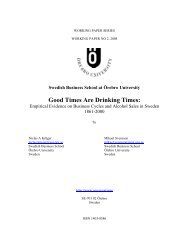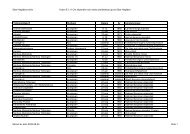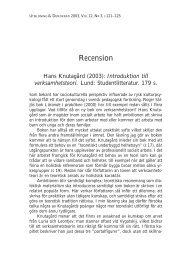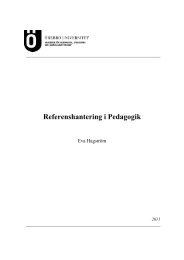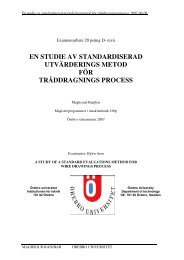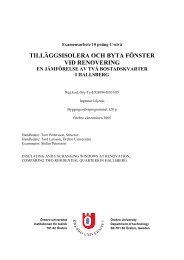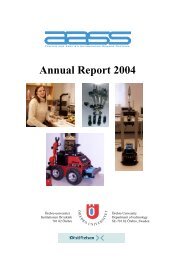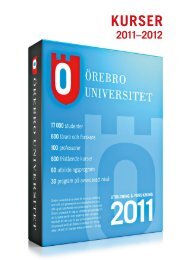Annual Report 2002 - Ãrebro universitet
Annual Report 2002 - Ãrebro universitet
Annual Report 2002 - Ãrebro universitet
You also want an ePaper? Increase the reach of your titles
YUMPU automatically turns print PDFs into web optimized ePapers that Google loves.
<strong>Annual</strong> <strong>Report</strong> <strong>2002</strong> 57<br />
2.4. Learning systems lab<br />
Our objective is to advance the state-of-the-art in the theory and practice of learning and<br />
adaptation in autonomous sensor systems. This will be achieved by developing strongly<br />
autonomous agents with the capacity to learn from experience and thus to adapt to highly<br />
dynamic and uncertain environments and working scenarios.<br />
These situations are extremely difficult to model by traditional methods of numerical analysis<br />
due to the highly unpredictable nature of both the agent's sensory perceptions and the effects<br />
of motor actions, and the presence of other agents such as humans. We therefore focus on<br />
learning and adaptation through interaction of the agent with the user and environment.<br />
The techniques that we apply include supervised and unsupervised machine learning<br />
algorithms such as artificial neural networks, genetic algorithms, self-organisation, etc.<br />
2.4.1 Focus<br />
The research focus of the Learning Systems Lab is the development of robots and<br />
autonomous systems, which can improve performance by learning from their own sensory<br />
input. At present, the research activities of the lab are organized around two major themes:<br />
1. Learning from machine-human interaction. This includes learning which facilitates<br />
cooperation between humans and machines, e.g., recognition, tracking and identification<br />
of humans by an autonomous robot; knowledge acquisition from a human expert, e.g.,<br />
diagnosis of medical images; and learning of robotic skills from demonstrations by a<br />
human operator.<br />
2. Learning sub-symbolic representations and behaviours for robotic systems. This includes<br />
the acquisition of internal models such as cognitive maps through active exploration of the<br />
environment, and learning of sensor-motor competences that map sensor readings directly<br />
onto motor actions, resulting in complex behaviour grounded in the sensor-motor<br />
experience of the agent.<br />
The research methodology of the Learning Systems Lab is based on developing theoretically<br />
sound solutions to real world problems, and places strong emphasis on a tight coupling<br />
between theory and empirical methods; including the use of performance metrics, quantitative<br />
comparisons of actual systems, and statistical tests of significance.





